Do AR15 Compensators do what they say they do? A quality compensator should reduce muzzle rise for faster target reacquisition and follow-up shots. What if we told you a muzzle brake may be a better option? We tested 7 popular AR15 compensators to find an answer and boy, did we!
Table of contents
P.S. You might want to bookmark this page because the more compensators we get our hands on…the more this list will grow. That way you will always have a resource for the latest and greatest.
What is a Compensator?
Before we start dissecting each comp we played with we should ask ourselves: “What is a compensator?” and “Why would I want one?”.
In theory, a compensator uses strategic gas vents to counteract muzzle rise. Meaning that it should vent gas upward and force the muzzle downward. Why do we say “theory”? You’ll find out.
More physics magic in our Muzzle Device Guide.
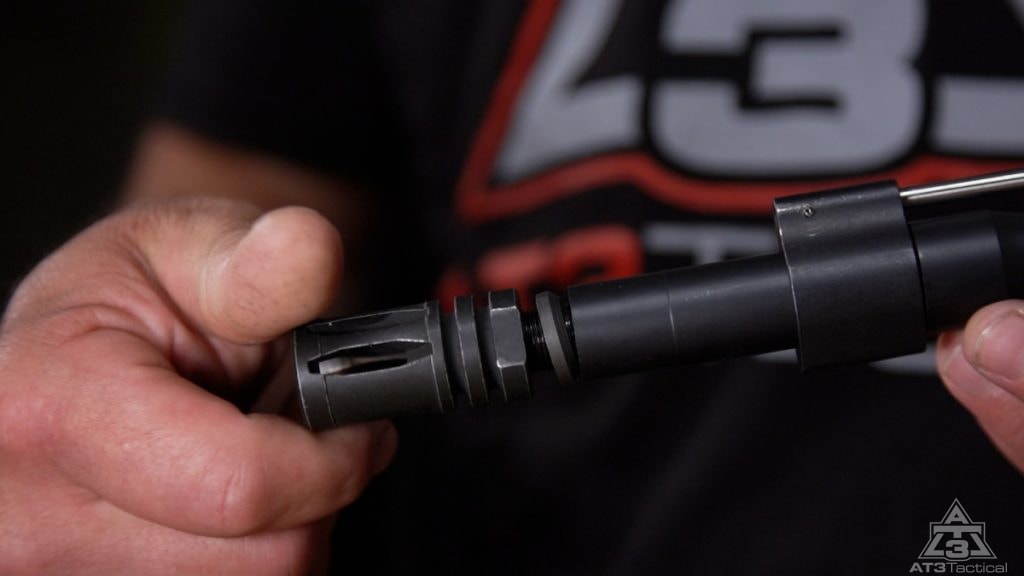
Main Testing Criteria
What better way to test muzzle rise than shooting as fast as you can with a binary trigger? Okay, so you just saw us mention a binary trigger. What exactly is that?
- Three Rifles – All mechanically the same (we made sure). One was naked as a control with no muzzle device. Another was being fired with X compensator while the other was being fitted with a new one and they would swap places.
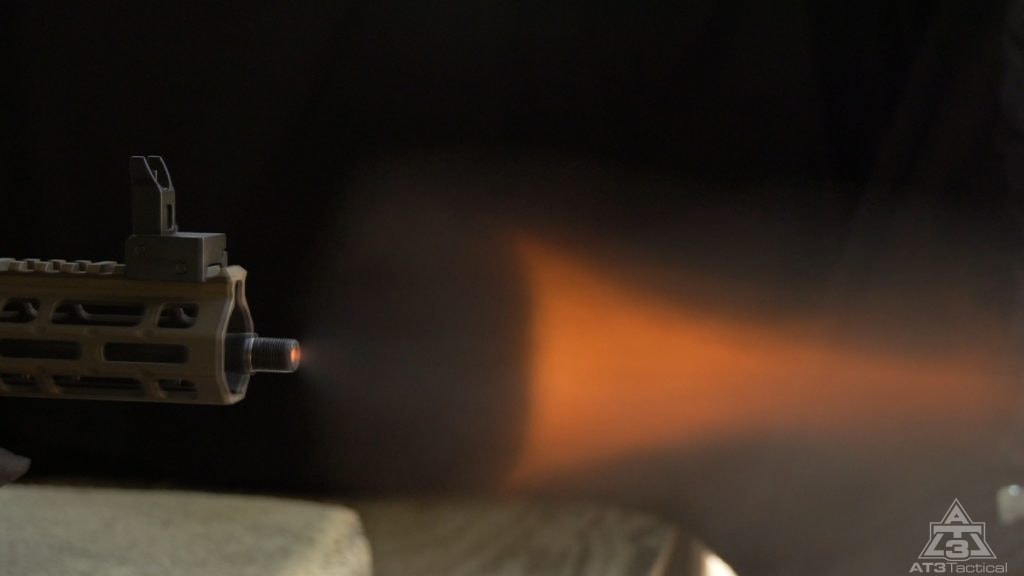
- Three Testers – All three of us would fire 5 shots rapidly and write down our thoughts and “grade” accordingly.
- Bystander Positioning – One person shooting, one standing off to the side of the shooter, and the last person to the side and behind the shooter. This way it was a good grasp on any concussion dispersion or lack thereof.
The key factors we evaluated were muzzle rise reduction, concussion, build quality, weight, and price. Our focus was real-world testing, not lab experiments. However, we did have the help of a handy dandy binary trigger just to push a given muzzle device that much more.
Top 5 Best AR15 Compensators
Bit of a spoiler BUUUT we found that not one of these will outperform a literal muzzle brake. Maybe that is because none of them appear as the definition of a compensator. That said, if you really need a muzzle device labeled as a “compensator” then let’s kick it off with the most popular one we could find.
1. Most Popular AR15 Compensator
Strike Industries JCOMP Gen 2
The Strike Industries JCOMP Gen 2 was found to be recommended 9 times out of 10 as far as AR-15 compensators go. Its popularity across various platforms has made it a go-to choice for many AR owners looking for a “comp” but to a trained eye that has a basic notion of fluid dynamics, this resembles more of a muzzle brake than a comp. Rather than a by-the-book look, it is a hybrid compensator/brake aimed to reduce both recoil and muzzle rise.
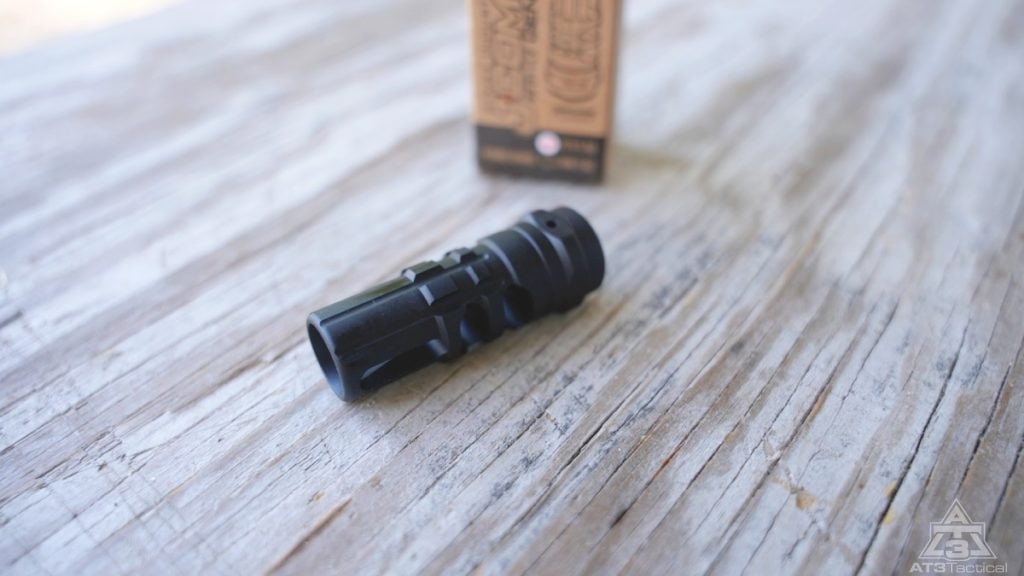
Things we liked:
- Price – Pretty middle-of-the-road and affordable.
- Looks – Unique and different.
- Accessory Interface – Will work with other Strike Industries muzzle device attachments.
Things we didn’t like:
- Wrench Flats – Very small.
- Muzzle Rise – Didn’t seem to help. Acted more like a muzzle brake…not a great one.
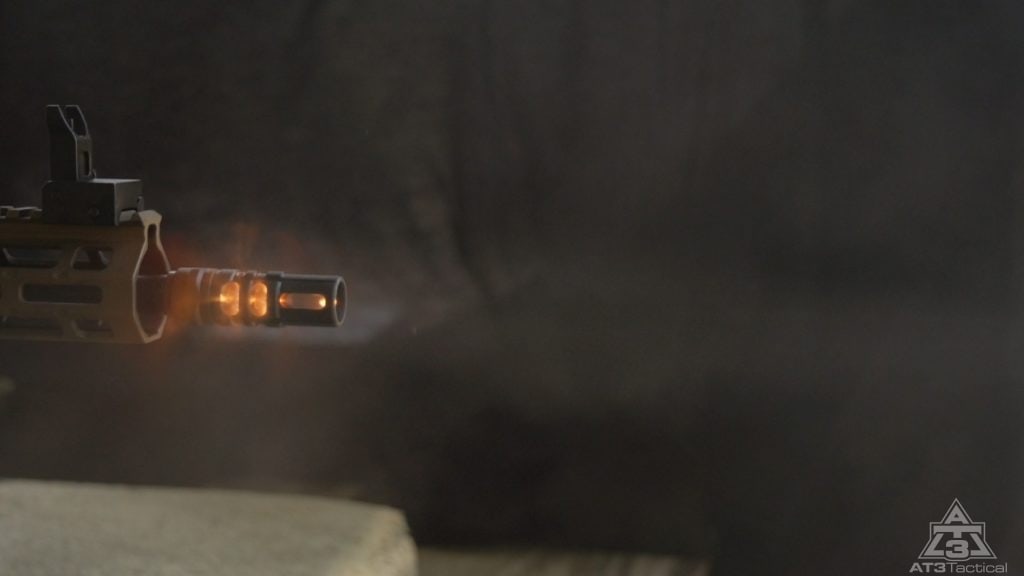
In our hands-on testing, the JCOMP Gen 2 performed okay (just okay), though most compensators didn’t really stand out from the pack. These guys retail for around $40 so that’s an okay chunk to chew, swallow, and see how you like it.
2. Best Budget AR15 Compensator
Mission First Tactical 6 Direction AR 15 Compensator
The Mission First Tactical 6 Direction AR 15 Compensator has a slim, low-profile design that resembles a flash hider aesthetically. Despite its looks, it doesn’t provide much in the way of flash hiding. There is a ton of flash! Performance-wise, it was on the gassier side during our testing.
However, it does have some positives going for it. The Mission First Tactical compensator is very affordable at around $40, making it a good budget-friendly option. It’s also slim and lightweight, adding minimal bulk and weight to your AR’s front end.
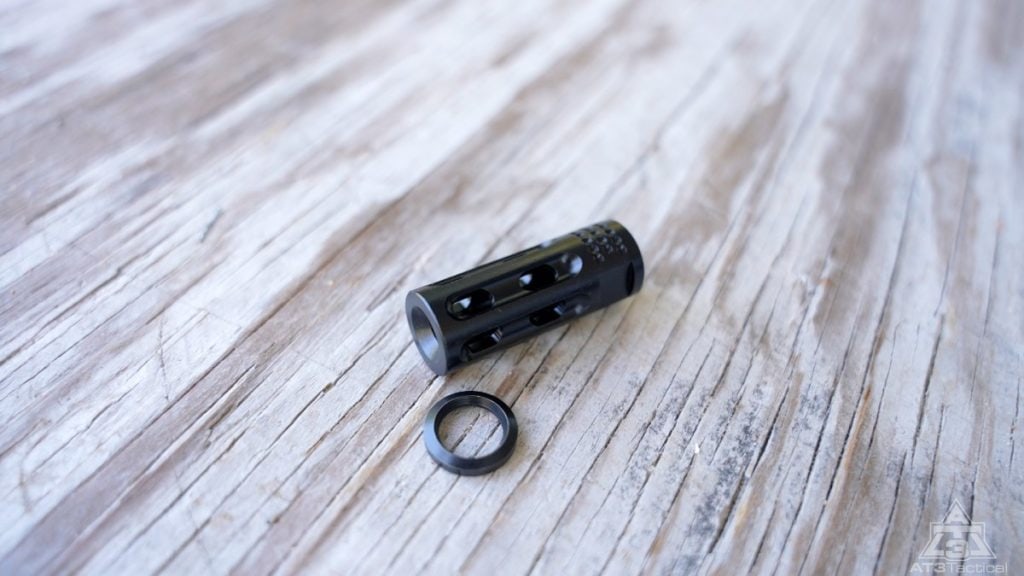
Things we liked:
- Price – Cheap at $40.
- Shape – Skinny.
- Weight – Very lightweight.
Things we didn’t like:
- Wrench Flats – Very small non-standard ⅝” flats.
- Muzzle Rise – No noticeable help.
- Flash – Looks like a flash hider, but oh baby there is flash!
- Gassy – Extremely gassy. Slap on the gas mask for this one.
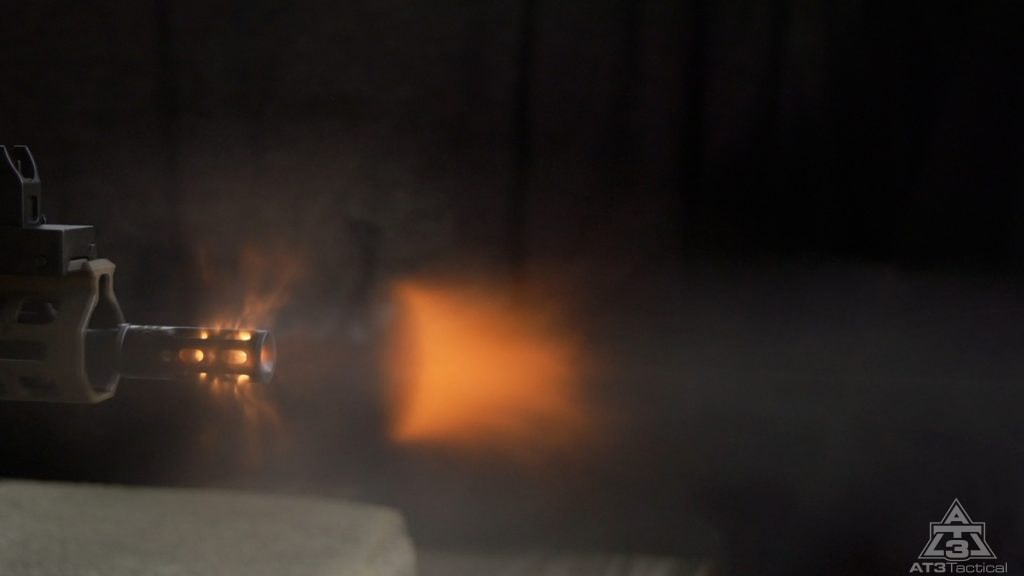
While it won’t win any awards for performance, this compensator can still be a practical choice for those wanting a slim, lightweight addition to their AR without breaking the bank. Sometimes simple and affordable does the job!
3. Best AR15 Compensator for Reduced Muzzle Rise
Rise Armament HP Compensator
The Rise Armament HP Compensator was our top pick for reducing muzzle rise, though it performed more like a middle-of-the-road muzzle brake than a true compensator…This was because it basically is a muzzle brake. It excelled at mitigating recoil and muzzle climb compared to other models tested.
Installation was straightforward. However, it does come with a premium price tag of around $90, making it one of the more expensive options out there.
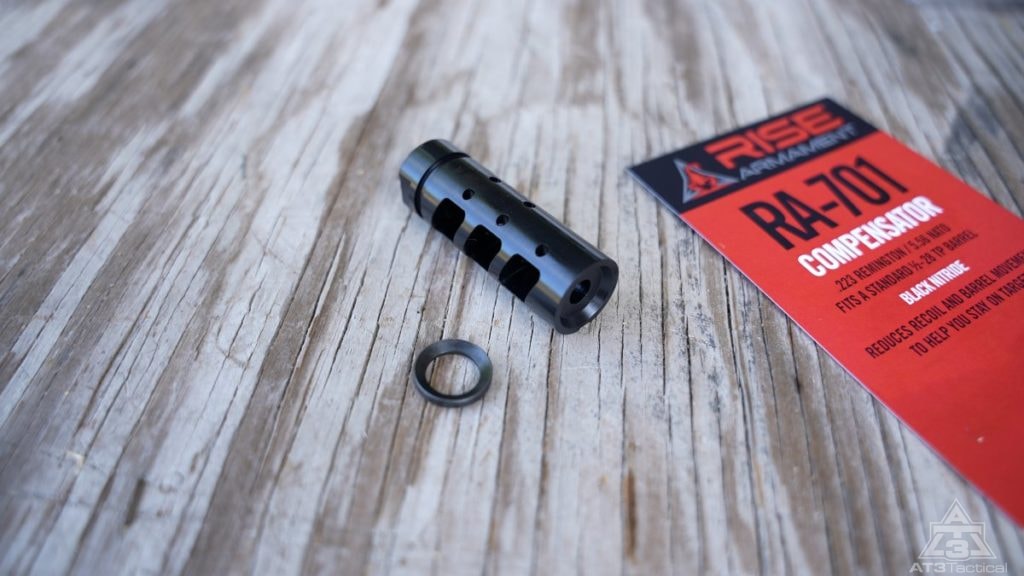
Things we liked:
- “Standard” Wrench Flats – Any old AR15 armorer’s wrench will do the job.
- Recoil – Solid mitigation.
- Muzzle Climb – The recoil soak really aided the lack of muzzle climb here.
Things we didn’t like:
- Price – Oof this guy is spendy, especially when you could pick up a literal muzzle brake for cheaper.
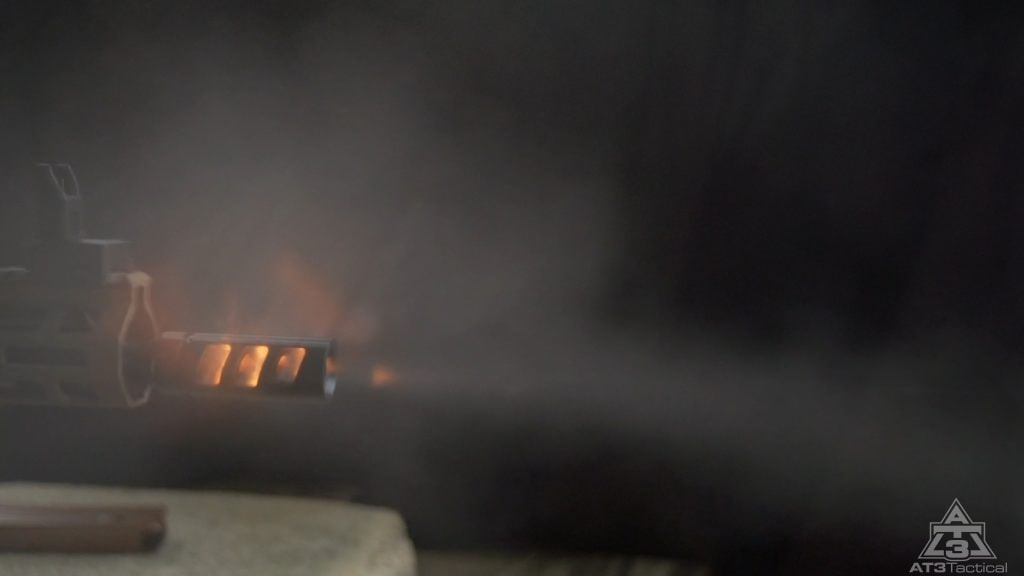
While not a compensator in the truest sense, the Rise Armament HP delivers noticeable improvements in taming recoil and muzzle rise. If those are your main concerns, it’s a solid performer despite the higher price point. At the end of the day, solid recoil mitigation may matter more to some AR owners than textbook compensation performance.
4. Best AR15 Compensator for Concussion Reduction
Odin Works Atlas AR 15 Compensator
The Odin Works Atlas AR 15 Compensator was our top pick for concussion reduction. It comes with a premium price tag of around $100, making it one of the more expensive options tested.
Performance-wise, the Atlas delivered a little compensation but like the rest, if it was noticeable it was barely any. Some of that may have to do with its weight. It is the heaviest and most complex compensator we looked at, with an intriguing design. We appreciated that it didn’t require any special washers or timing nuts for installation. The Atlas can be timed no matter what.
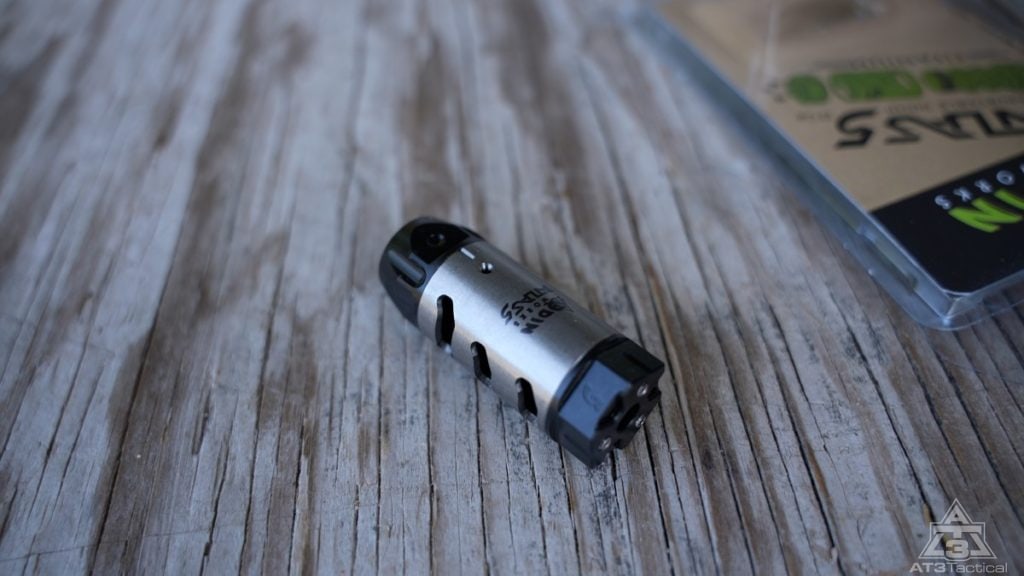
Things we liked:
- No Timing! – There is no need to time this with nuts, shims, or washers. It uses an easily adjustable shroud.
Things we didn’t like:
- Price – $100 for the complicity and uniqueness not necessarily stellar performance with this criteria.
- ⅞” Wrench flats – Can’t use our armorer’s wrench.

Overall though, the Atlas stood out for reducing concussion but only slightly better than others. If you need to have a comp but want concussion control this is your cat. If concussion mitigation is your priority above all, it may be more worthwhile to look into a linear compensator.
5. Best Short AR15 Compensator
AT3 Tactical AR-15 Compensator
Our very own AT3 Tactical AR-15 Compensator should be slotted for the best budget but instead, it slid into the short category. Does it perform? Eh, it followed the lead of the other comps in the pack…if that tells you anything, but if a compensator is what you’re after, this one fits the length bill.
At around $35, this is one of the more affordable options we tested. Of all the compensators, ours had the shortest overall length. A close second would be the Strike Industries Mini King Comp, but its flash hider prongs make it slightly longer than the AT3.
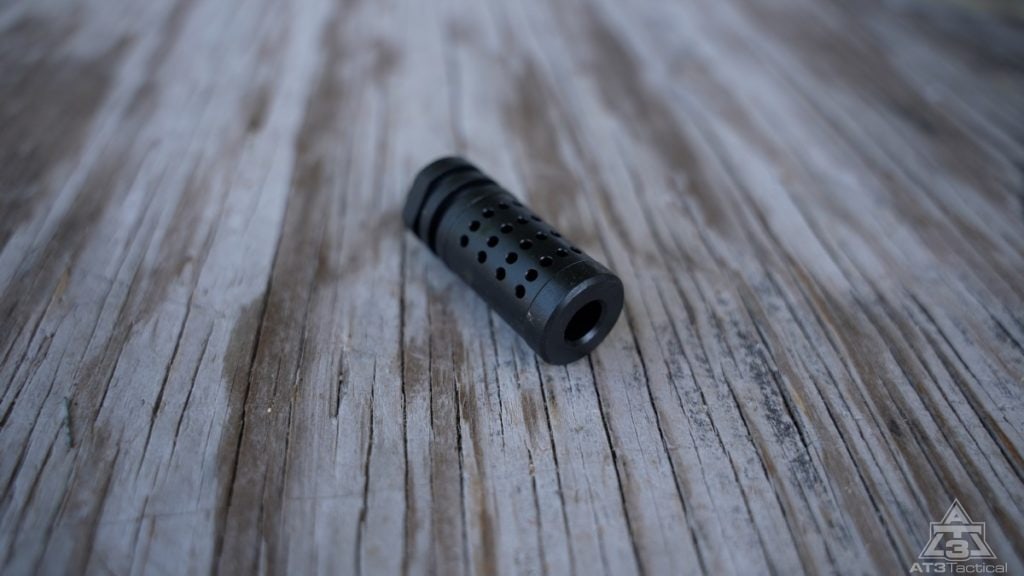
Things we liked:
- Price – It’s $35. That’s not bad for a compact compensator with a cool look.
Things we didn’t like:
- Muzzle Rise Reduction – The short stature definitely plays a part in its lack of effect as a compensator.
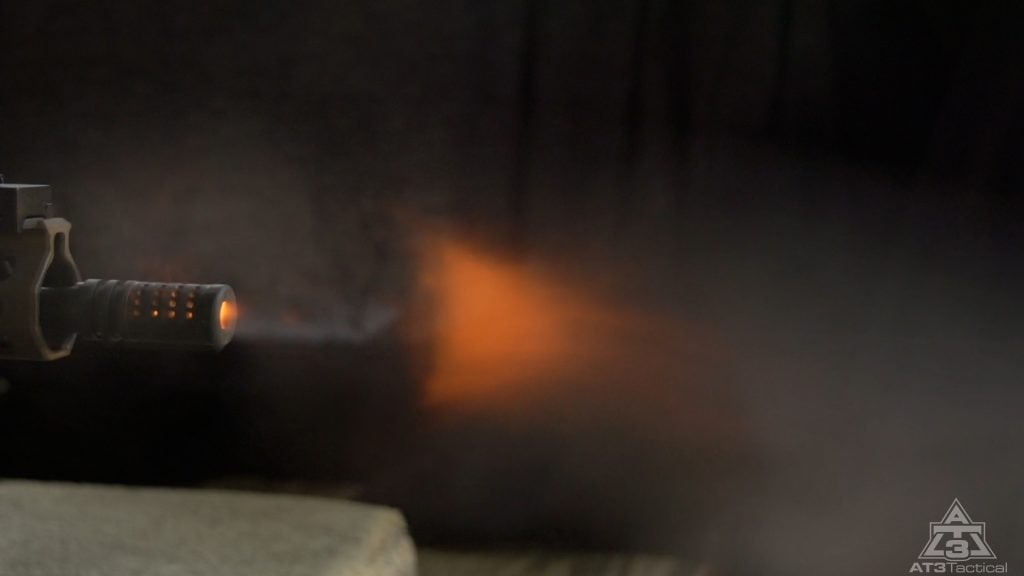
It has a unique beehive aesthetic to stand out. In rapid-fire testing, it performed similarly to other compensators – with minimal noticeable reduction in muzzle movement. But if you want a short, budget-friendly compensator just to change up the look of your AR, the AT3 Tactical is a solid choice. Sometimes compactness and affordability get the job done!
Honorable Mentions
These guys may not have made the cut but it was not necessarily because they performed worse. In fact, the three of us testers agreed that just about every comp performed so closely (except the Rise Armament brake…I mean comp) that they would be listed almost exclusively on the rest of the categorical criteria. That being said, here is the rest of our test group that may be worth a closer look at.
Strike Industries AR 15 Mini King Comp
The Mini King Comp also acted more akin to a muzzle brake than a compensator. Its performance was limited due to its short size, but true compensation performance seems to be in the eye of the beholder at this point.,. The mini may work well for those wanting to minimize length.
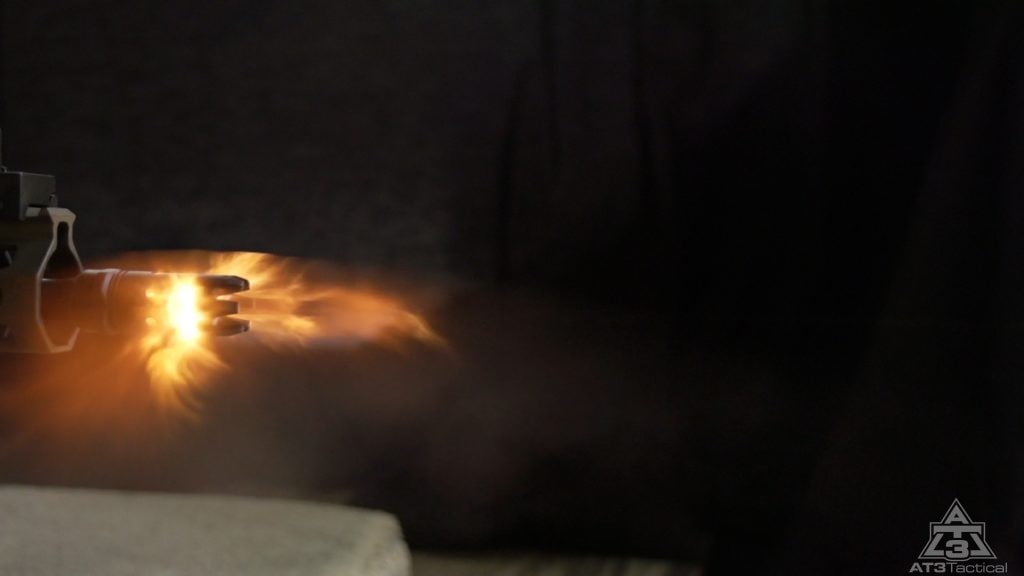
Our biggest gripe beyond its shotty performance was that it has tiny wrench flats for installation. While not excelling in compensation, the Mini King adds some attitude to your AR’s muzzle without much-added length.
Strike Industries AR 15 King Comp
The Strike Industries King Comp functioned more like a muzzle brake in our testing. It was on the gassier side and didn’t provide a noticeable reduction in muzzle climb.
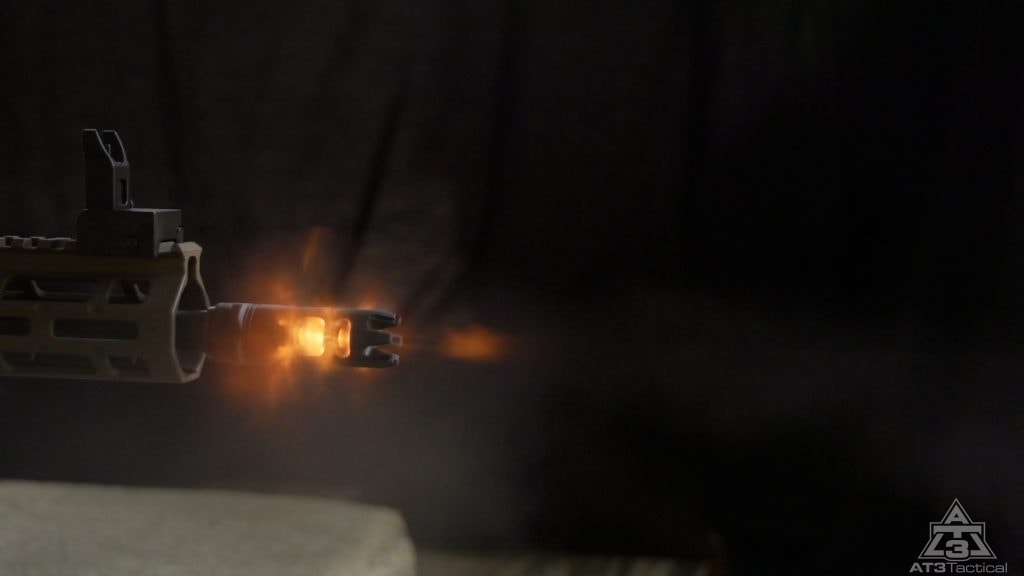
However, it does have an aggressive, eye-catching aesthetic. And it can interface with Strike’s Oppressor attachment. At around $45 it’s moderately priced, and a good option if you want a fierce-looking brake that may also work with a linear comp.
Weight Layout
As we mentioned earlier, weight matters to many AR enthusiasts for fast maneuvering. So we weighed each compensator along with mounting hardware like crush washers. Don’t want extra ounces slowing you down! Here’s how the Compensators stacked up:
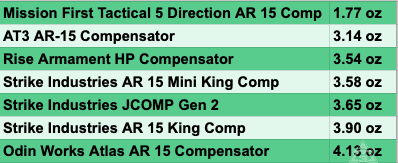
What is a Binary Trigger?
Binary triggers are designed with faster follow-up shots in mind. When pulled and released quickly you can get a fair bit of rapidity. When the trigger is pulled it fires one shot and when the trigger is released it fires one shot. This does not make your AR15 full auto. If you are interested in a binary trigger, Franklin Armory is king but make sure you check your local laws regarding binary triggers before pulling the trigger…Get it?

Enough about triggers. Let’s dive into our lineup of compensators and tabulate some telling results!
Down and Out!
Testing AR-15 “compensators” was eye-opening. We feel most are hybrids – a combo of a flash hider and muzzle brakes. Strangely enough, they all performed lackluster in the muzzle rise department. The Rise Armament stood out for controllability by basically just being a mislabeled muzzle brake.
This shows compensators may be better suited to pistols, where the pivot point differs. For rifles, muzzle brakes with some vertical porting seem ideal. After this test, many of us here at AT3 are starting to question whether or not a true compensator exists for an AR15 that is not a muzzle brake. Obviously, we were not able to accurately test that this time around but we aren’t done yet This topic will be revisited with a more science-y test!
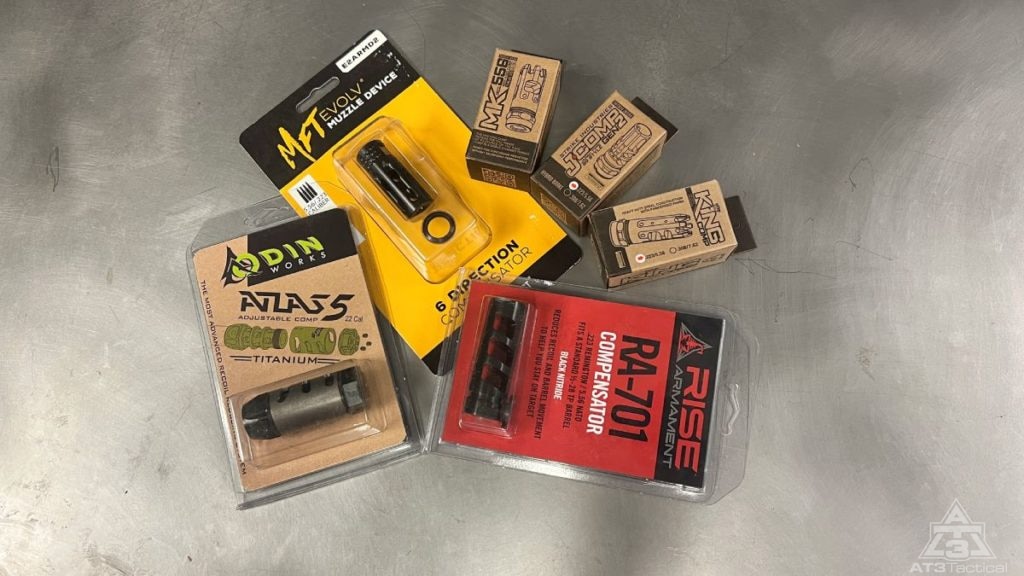
Before you folks head out do you feel we missed one? Let us know in the comments or check out some of our other muzzle device content to see if we had a chance to put it to the test at the range!
Answering more of your muzzle device questions:
FAQs
They are extremely similar in that they both vent gas but the difference lies in where they vent gas. Compensators vent gas upwards whereas muzzle brakes vent out the sides (often at an angle). Gas vented upward helps with muzzle climb while gas vented to the sides helps tame recoil.
Yes, they can but they are not designed to directly do so. Some may have the right amount of geometry vent gasses enough to help with recoil.
No. Muzzle brakes will always be better at taming recoil than compensators.
Potentially though unlikely. Most AR-15 compensators do not vent off enough gas fast enough for it to affect the gas system and subsequently the function of your firearm.
No. You do not want your handguard to be as long as or longer than your compensator because the vented gas could and probably would harm the handguard.
One Last Tip
If there’s anyone that knows the AR-15 platform, it’s the US military. As a special offer for our readers, you can get the Official US Army Manual for AR-15/M4/M16 right now – for free. Click here to snag a copy.


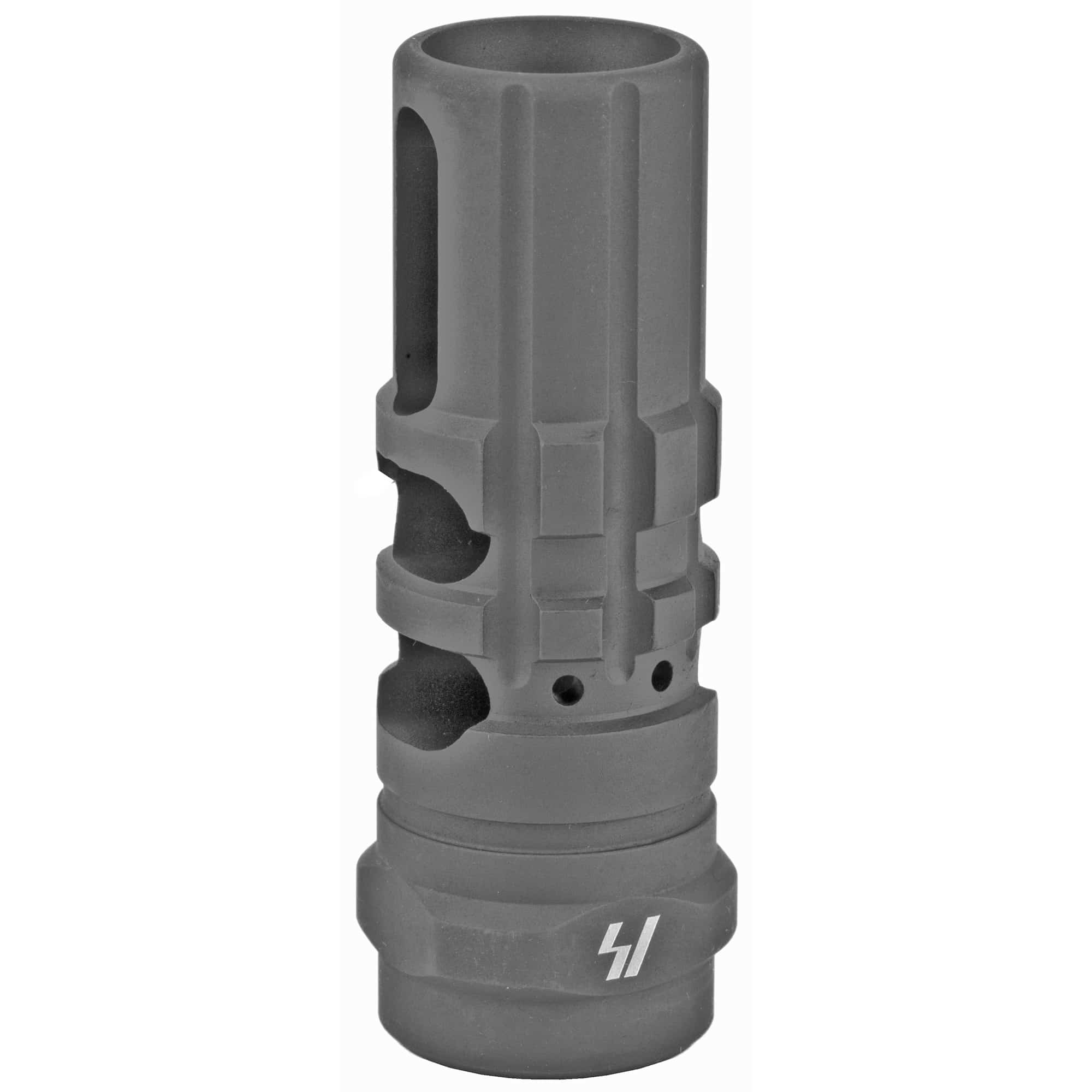
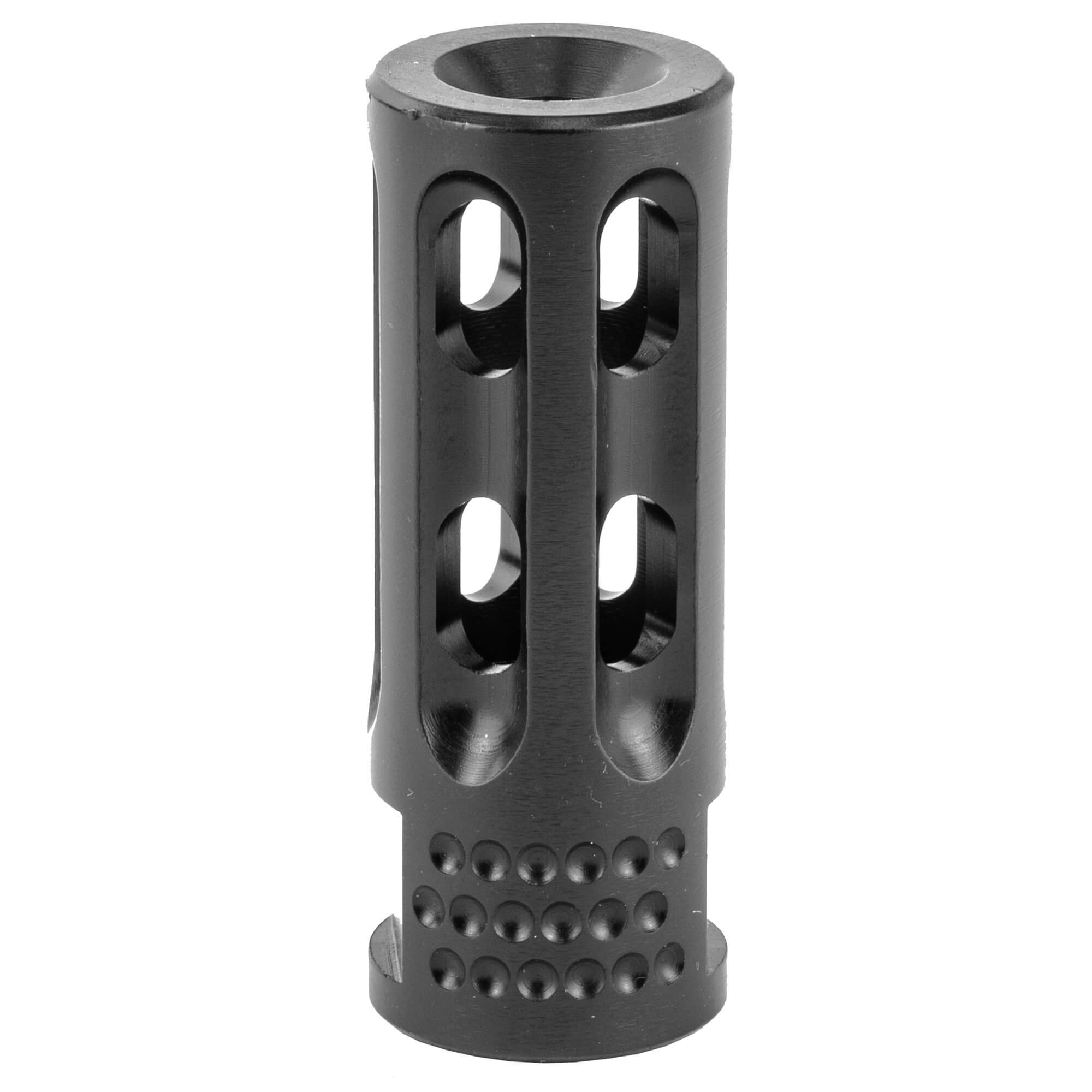
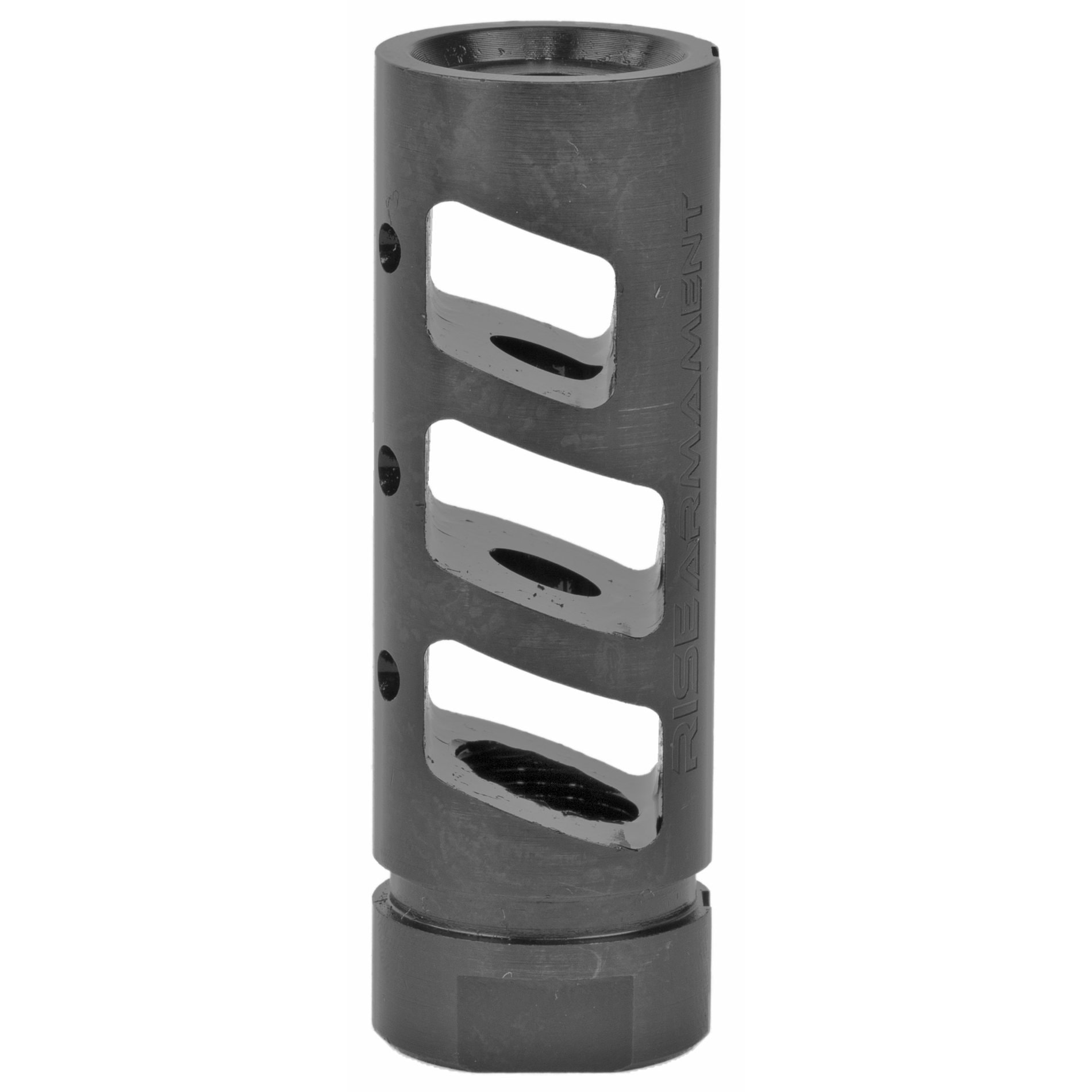
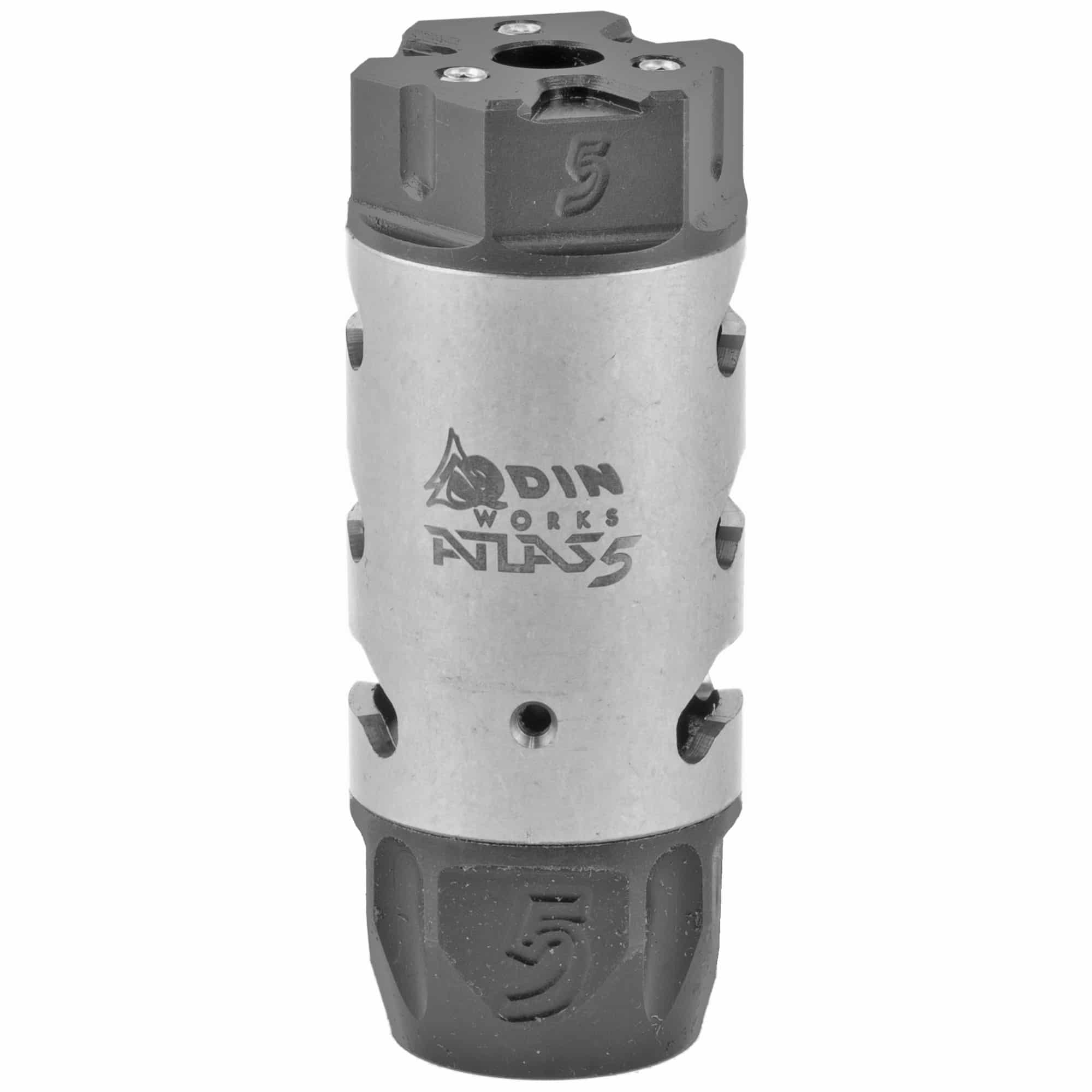
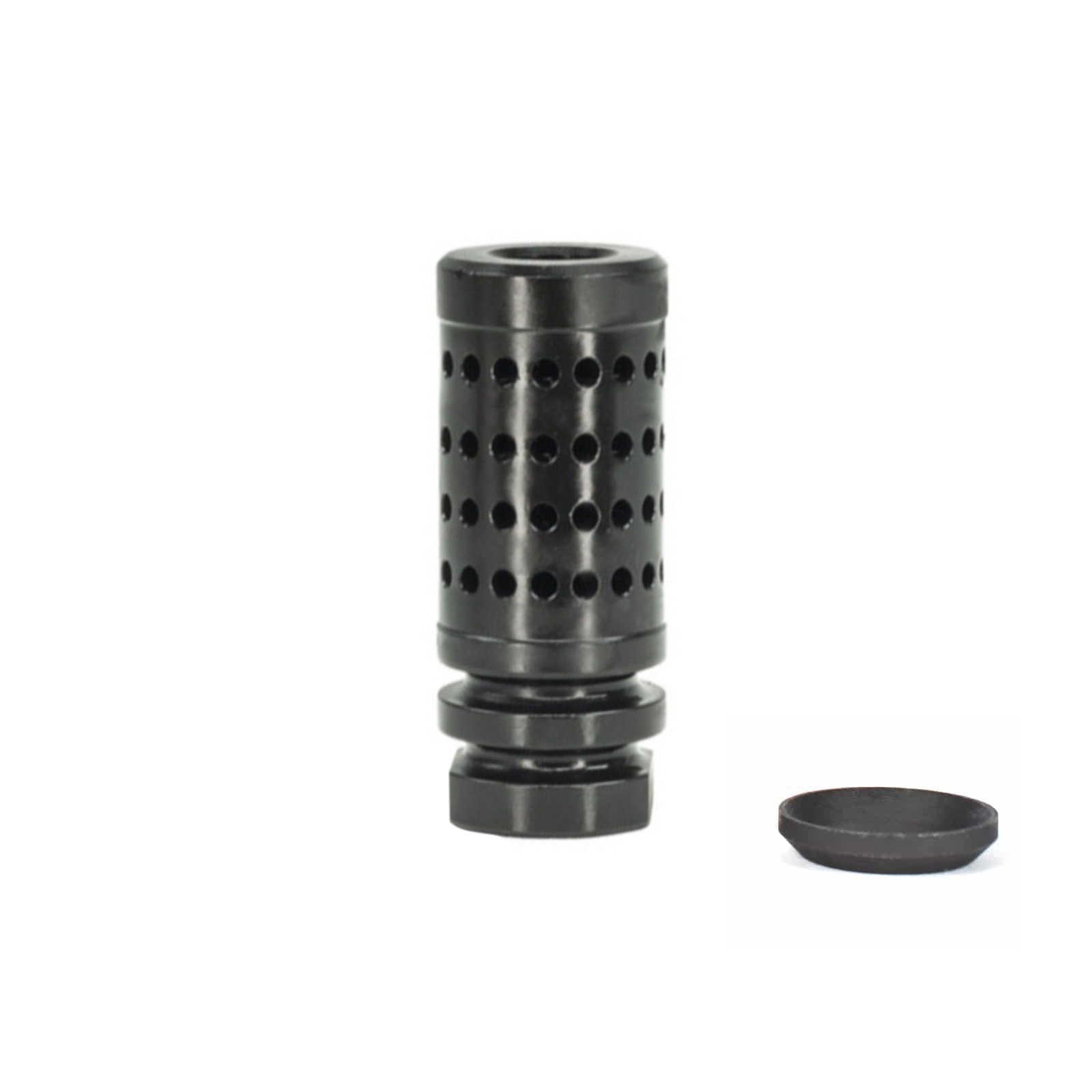
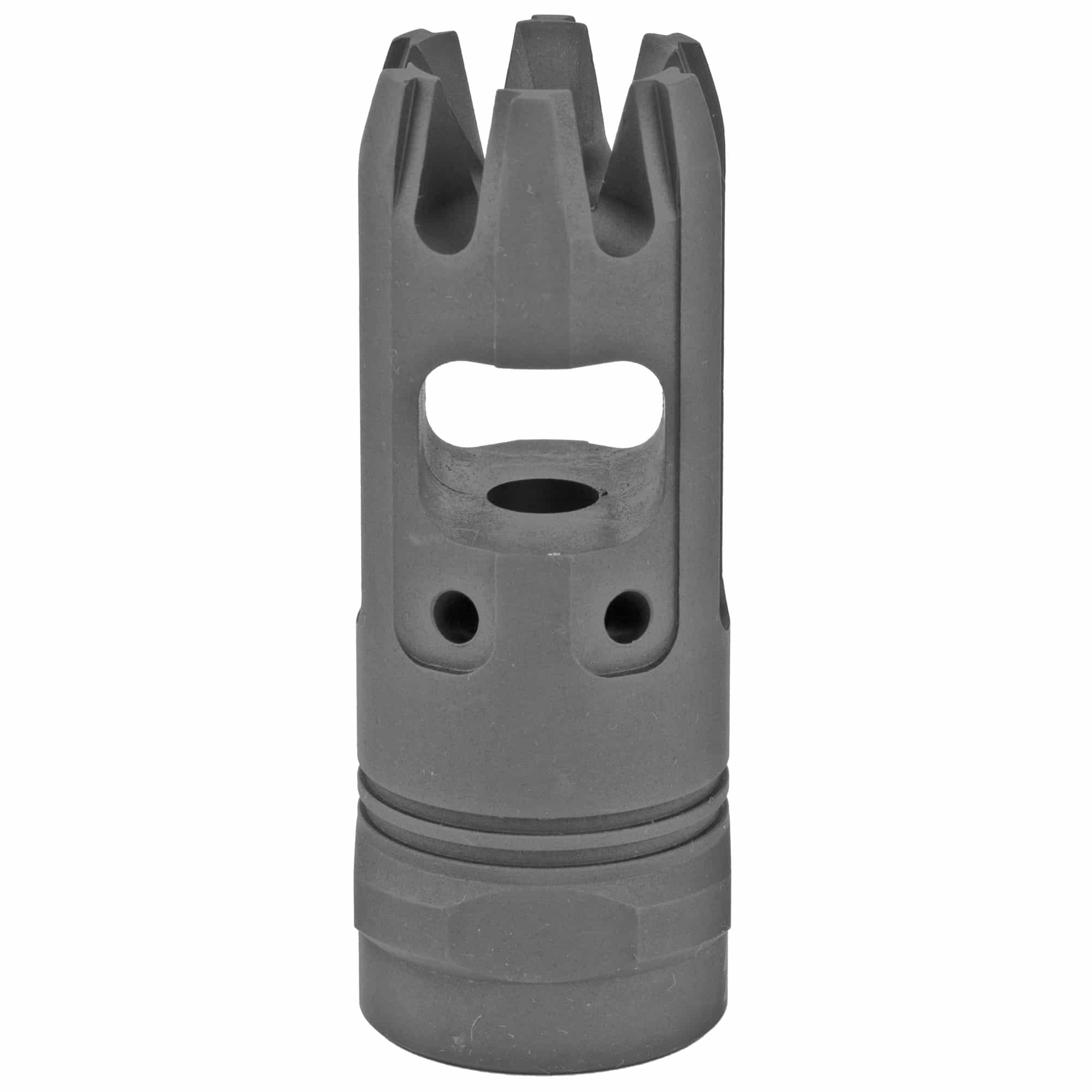
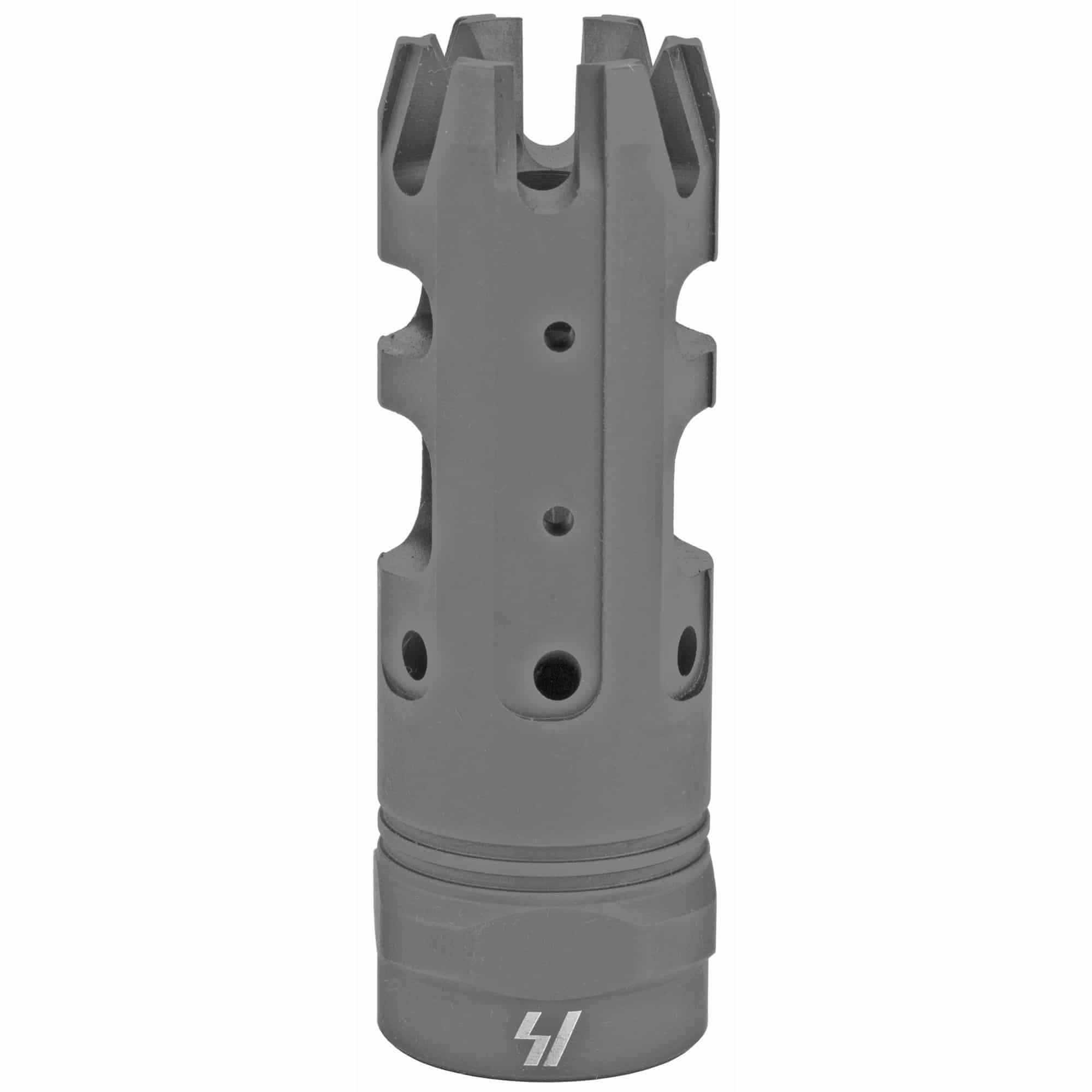
Im a long time cmmg fan. Like the idea y’all do testing to give us builders great ideas for putting out good products. Ready to give dead air a try now
I would like to see more testing of different comps and brakes, but instead of using a bare muzzle as the basis of comparison, you test against the ubiquitous A2 Birdcage. Pretty much any AR derivative you buy now, no matter the barrel length, comes with an A2 on the end.
You should text the EFAB and the AFAB